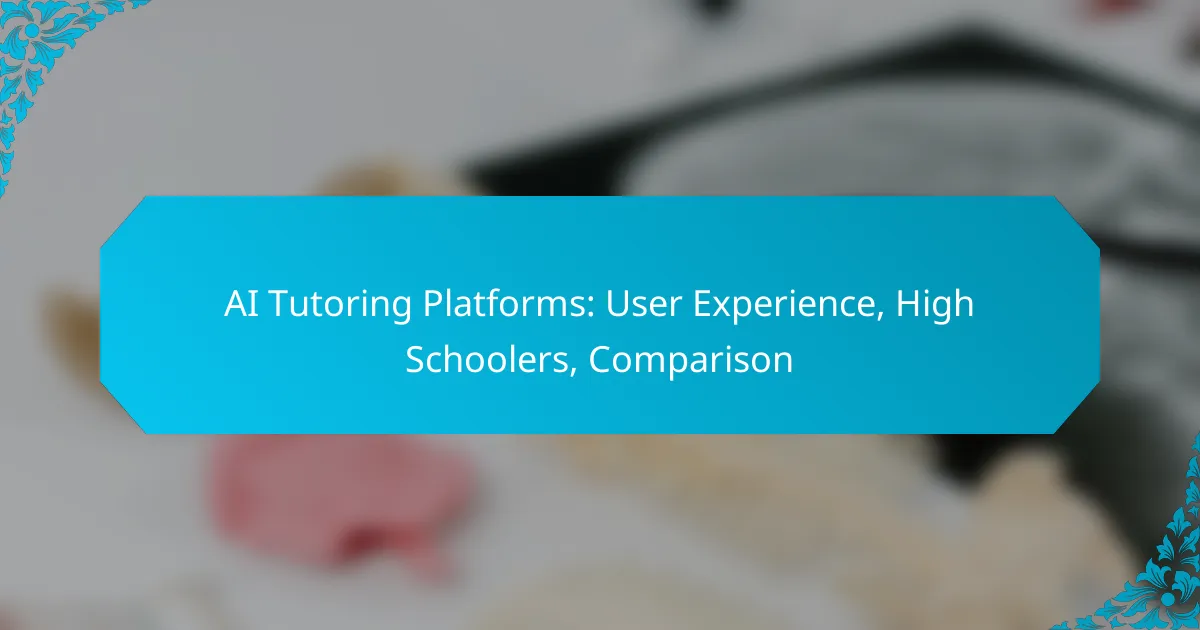AI tutoring platforms for high schoolers are designed to provide personalized learning experiences that cater to individual needs across various subjects. By leveraging advanced algorithms, these platforms enhance user experience through tailored educational support, ensuring students engage with material that aligns with their learning styles. When evaluating different platforms, it’s essential to consider factors such as pricing models, subject coverage, and user interface to find the best fit for effective learning assistance.
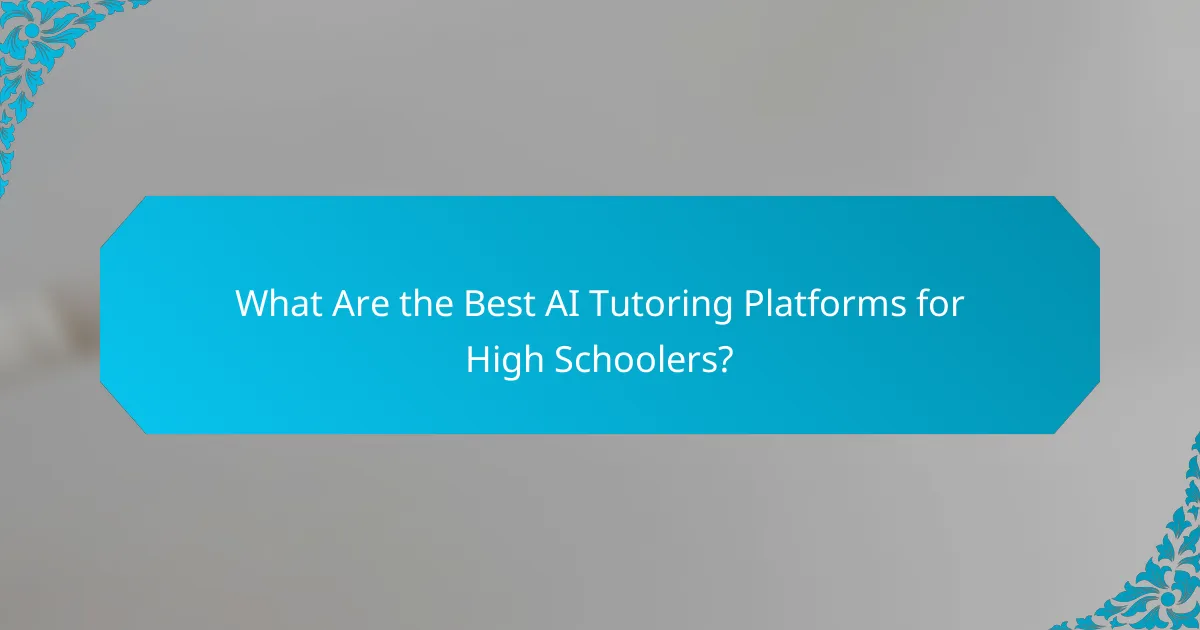
What Are the Best AI Tutoring Platforms for High Schoolers?
The best AI tutoring platforms for high schoolers offer personalized learning experiences, interactive content, and support across various subjects. Key platforms include Khan Academy, Chegg Tutors, Wyzant, Brainly, and Coursera, each with unique features tailored to student needs.
Khan Academy
Khan Academy is a free online resource that provides a wide range of subjects, including math, science, and humanities. It uses adaptive learning technology to tailor lessons to individual student progress, making it ideal for high schoolers seeking to strengthen their understanding.
Students can track their learning through personalized dashboards, and the platform offers practice exercises and instructional videos. This self-paced approach allows learners to revisit concepts as needed, which can be particularly beneficial for mastering challenging topics.
Chegg Tutors
Chegg Tutors connects students with expert tutors for one-on-one sessions across various subjects. This platform operates on a pay-per-session model, allowing high schoolers to get help when needed without a long-term commitment.
Chegg offers flexible scheduling and the ability to choose tutors based on ratings and expertise. This can help students find the right fit for their learning style, ensuring a more effective tutoring experience.
Wyzant
Wyzant is a tutoring marketplace where students can find local and online tutors for personalized instruction. High schoolers can browse profiles, read reviews, and compare rates, making it easy to find a tutor that fits their budget and subject needs.
Wyzant allows students to set their own schedules and choose between in-person or virtual sessions. This flexibility is advantageous for busy high school schedules, enabling students to receive help at their convenience.
Brainly
Brainly is a peer-to-peer learning platform where students can ask questions and receive answers from fellow learners and experts. This collaborative environment encourages high schoolers to engage with their peers while seeking help on homework and study topics.
While Brainly is free to use, a subscription model offers additional features like faster response times and access to verified experts. This can be beneficial for students who need quick assistance or more in-depth explanations.
Coursera
Coursera partners with universities and organizations to provide high-quality courses across various subjects. High schoolers can access courses that align with their interests or future college goals, often for free or at a low cost.
Courses typically include video lectures, quizzes, and peer-reviewed assignments, allowing students to learn at their own pace. This platform is ideal for those looking to supplement their high school education with advanced topics or specialized skills.
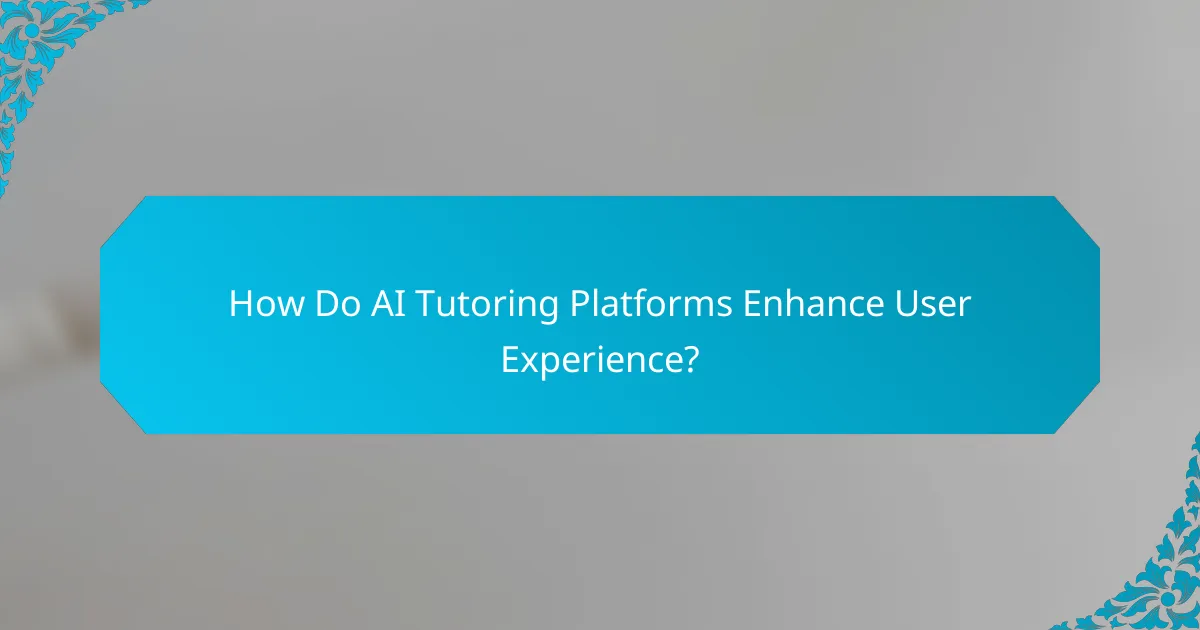
How Do AI Tutoring Platforms Enhance User Experience?
AI tutoring platforms significantly enhance user experience by offering tailored educational support that adapts to individual learning needs. These platforms leverage advanced algorithms to create personalized learning experiences, ensuring students engage with material that suits their pace and style.
Personalized Learning Paths
Personalized learning paths allow students to progress through material that aligns with their unique strengths and weaknesses. AI systems analyze performance data to recommend specific topics, ensuring that high schoolers focus on areas needing improvement while advancing through subjects they grasp well.
For instance, a student struggling with algebra might receive additional resources and practice problems in that area, while excelling in geometry could lead to more advanced challenges. This targeted approach helps maintain motivation and fosters a more effective learning environment.
Real-time Feedback
Real-time feedback is a crucial feature of AI tutoring platforms, providing immediate insights into a student’s performance. As students work through exercises, the system evaluates their responses and offers instant corrections or suggestions, allowing for quick adjustments to learning strategies.
This immediate feedback loop helps high schoolers understand mistakes and learn from them on the spot, which can be more effective than waiting for traditional grading. Engaging with content in this way can lead to improved retention and mastery of subjects.
Interactive Content
Interactive content enhances engagement by incorporating multimedia elements such as videos, quizzes, and gamified learning experiences. These features make learning more dynamic and can cater to various learning styles, appealing to visual, auditory, and kinesthetic learners alike.
For example, a platform might include interactive simulations for science experiments or gamified math challenges that reward progress. This approach not only makes learning enjoyable but also encourages consistent practice, which is essential for academic success.
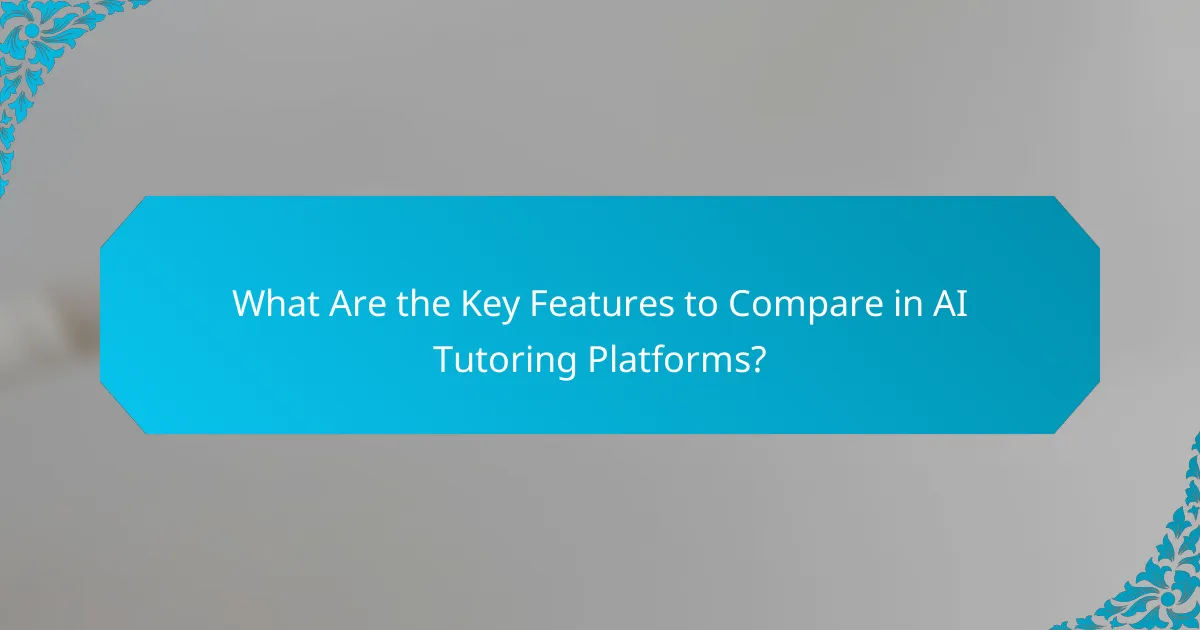
What Are the Key Features to Compare in AI Tutoring Platforms?
When comparing AI tutoring platforms, focus on pricing models, subject coverage, user interface, and availability of tutors. These features significantly impact the overall user experience for high school students seeking effective learning assistance.
Pricing Models
Pricing models for AI tutoring platforms can vary widely, typically ranging from subscription-based to pay-per-session options. Subscription plans may cost between $20 to $100 per month, while pay-per-session models can charge anywhere from $10 to $50 per session.
Consider your budget and how often tutoring will be needed. Some platforms offer free trials or tiered pricing based on features, which can help you find the best fit without overspending.
Subject Coverage
Subject coverage is crucial for ensuring that the platform meets the academic needs of high school students. Many platforms offer a wide range of subjects, including math, science, languages, and test preparation.
Check if the platform specializes in specific subjects or offers comprehensive coverage. For example, some may excel in STEM subjects while others focus on humanities or standardized test prep, which can influence your choice based on the student’s needs.
User Interface
A user-friendly interface enhances the learning experience on AI tutoring platforms. Look for intuitive navigation, clear layouts, and engaging interactive elements that facilitate easy access to resources.
High schoolers may prefer platforms that offer mobile compatibility and real-time feedback features. A well-designed interface can significantly affect how effectively students engage with the material.
Availability of Tutors
The availability of tutors can vary by platform, impacting the flexibility of scheduling sessions. Some platforms provide 24/7 access to tutors, while others may have limited hours based on tutor availability.
Consider whether the platform offers on-demand tutoring or scheduled sessions. Platforms with a diverse pool of tutors can better accommodate different learning styles and preferences, ensuring students receive the support they need when they need it.
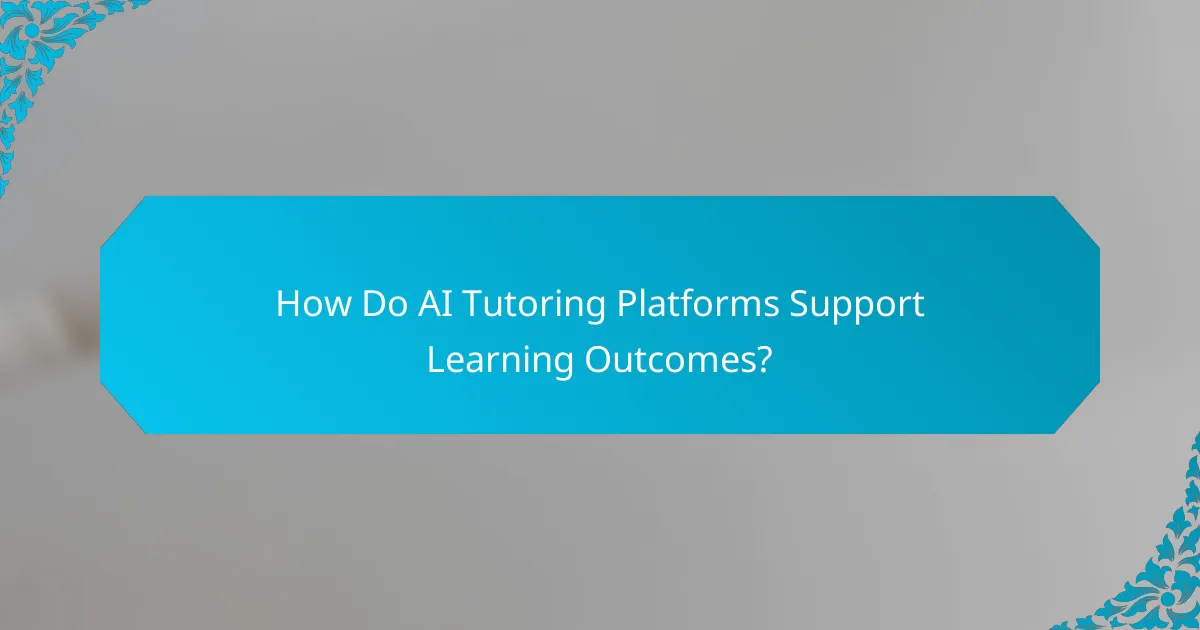
How Do AI Tutoring Platforms Support Learning Outcomes?
AI tutoring platforms enhance learning outcomes by providing personalized instruction, immediate feedback, and adaptive learning paths tailored to individual student needs. These tools leverage data analytics to identify strengths and weaknesses, enabling targeted support that can lead to significant academic improvements.
Improved Grades
AI tutoring platforms can lead to improved grades by offering customized learning experiences that address specific gaps in knowledge. For instance, a student struggling with algebra may receive targeted practice problems and explanations that focus solely on their weak areas.
Many users report grade increases of one letter or more after consistent use of these platforms. This improvement is often attributed to the immediate feedback and tailored resources that help students grasp challenging concepts more effectively.
Increased Engagement
Engagement levels among high schoolers can rise significantly when using AI tutoring platforms. These tools often incorporate gamification elements, such as rewards and progress tracking, which motivate students to participate actively in their learning process.
Additionally, the interactive nature of AI tutoring allows students to learn at their own pace, fostering a sense of ownership over their education. This autonomy can lead to a more invested attitude toward studying and completing assignments.
Enhanced Study Habits
AI tutoring platforms can help students develop better study habits by providing structured learning schedules and reminders. For example, a platform might suggest daily study goals based on the student’s progress, encouraging consistent practice and time management.
Moreover, many platforms offer analytics that allow students to reflect on their study patterns, helping them identify when and how they learn best. This self-awareness can lead to more effective study strategies and improved academic performance over time.
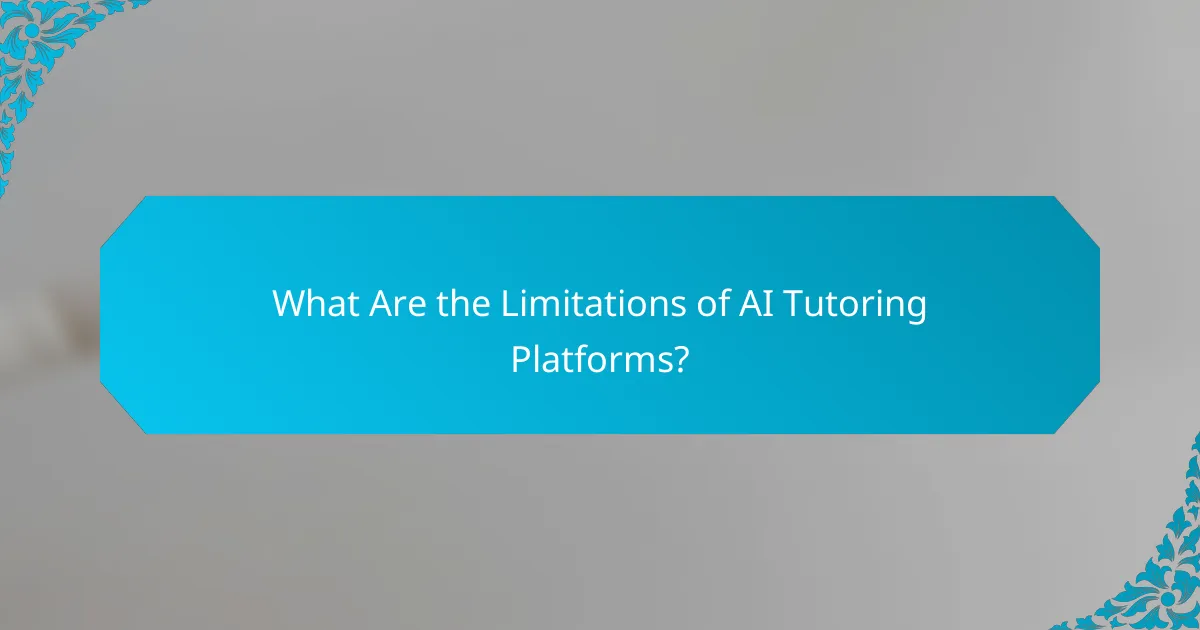
What Are the Limitations of AI Tutoring Platforms?
AI tutoring platforms offer innovative learning solutions, but they have notable limitations. Key challenges include a lack of personalized human interaction, potential gaps in understanding complex subjects, and reliance on technology that may not suit every learner’s needs.
Lack of Human Interaction
One significant limitation of AI tutoring platforms is the absence of human interaction. While these platforms can provide instant feedback and personalized learning paths, they cannot replicate the emotional support and encouragement that a human tutor offers.
This lack of human engagement can lead to feelings of isolation for students, particularly high schoolers who may benefit from social learning environments. For example, a student struggling with motivation might find it easier to engage with a live tutor who can offer empathy and encouragement.
To mitigate this issue, students should consider supplementing AI tutoring with occasional sessions with a human tutor. This hybrid approach can enhance understanding and provide the emotional support that AI lacks.
